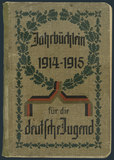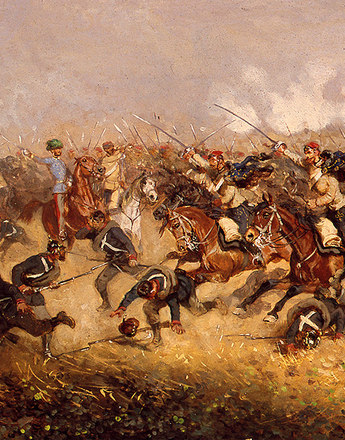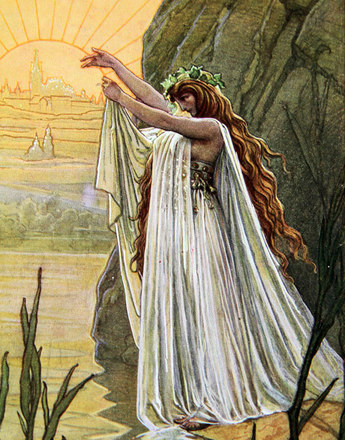-
Story The ‘German-Austrians’
Fear of losing hegemony: The German-Austrians in the Austrian multi-national state
-

1914-1915 annual for German youngsters. Published and dedicated to the beloved German youngsters by the German School Association, Brno, 1914
Copyright: Schloß Schönbrunn Kultur-und Betriebsges.m.b.H./Fotograf: Alexander E. Koller
Partner: Schloß Schönbrunn Kultur- und Betriebsges.m.b.H. -

Wilhelm Gause: The Brno German Riflemen's Association, drawing, 1908
Copyright: Schloß Schönbrunn Kultur-und Betriebsges.m.b.H./Fotograf: Alexander E. Koller
In the nineteenth century the Germans were considered by many to be the most important ‘guarantors of culture’ in Central Europe and were themselves convinced that they had a special cultural ‘mission’ to fulfil. This assumption, however, was increasingly challenged by the newly founded nationalist movements of the smaller peoples of the region.
From their position of superiority, the members of the German language group could initially afford to look benevolently on the smaller peoples’ desire for emancipation. However, when the smaller nations began to make demands that challenged the German leadership role, German nationalism in the Habsburg Monarchy went onto the defensive.
The status of the Germans as the Habsburg Monarchy’s ‘people of state’ was dealt an additional blow when Austria fell out of the process of German unification (following the defeat at Königgrätz in 1866). Although the Germans were still numerically the strongest nationality and occupied a privileged position in many respects, they were now just one of many nationalities under Habsburg rule.
The next blow followed in the following year, 1867, in the settlement with Hungary known as the ‘Compromise’ (‘Ausgleich’), as a result of which the Dual Monarchy now had a second ‘people of state’: the Magyars. And the very fact of having lost the battle for primacy in Hungary made the Germans more radical in their pursuit of hegemony in Cisleithania, with some nationalistically minded German-Austrians taking refuge in Pan-German fantasies in order to cope with the direct competition from the other peoples.
In everyday politics the German nationalists now pursued a headlong course of confrontation with the other nationalities. A large number of associations and societies were founded in order to consolidate and safeguard the Germans’ national position and heritage, most especially in the field of schooling and cultural institutions: the ‘German Schools Association’ (1880), for example, or the ‘Society for the Southern March’ (1889). Mixed-language areas in particular saw the launching of aggressive campaigns against the other language groups represented in the respective areas. Raising the battle cry of ‘German Protection Work’ (‘Deutsche Schutzarbeit’) the Germans entrenched for a sustained battle against the Slav nationalities, who were polemically accused of pursuing Pan-Slavic tendencies under Russian influence. In German nationalist polemics ‘Austrian Germandom’ was hailed as a ‘brave outpost of German culture’, buffeted on all sides by the stormy waves of a ‘Slavic sea’.
Translation: Peter John Nicholson
Kann, Robert A.: Zur Problematik der Nationalitätenfrage in der Habsburgermonarchie 1848–1918, in: Wandruszka, Adam/Urbanitsch, Peter (Hrsg.): Die Habsburgermonarchie 1848–1918, Band III: Die Völker des Reiches, Wien 1980, Teilband 2, 1304–1338
Rumpler, Helmut: Eine Chance für Mitteleuropa. Bürgerliche Emanzipation und Staatsverfall in der Habsburgermonarchie [Österreichische Geschichte 1804–1914, hrsg. von Herwig Wolfram], Wien 2005
Stourzh, Gerald: Die Gleichberechtigung der Nationalitäten in der Verfassung und Verwaltung Österreichs 1848 bis 1918, Wien 1985
Sutter, Berthold: Die Deutschen, in: Wandruszka, Adam/Urbanitsch, Peter (Hrsg.): Die Habsburgermonarchie 1848–1918, Band III: Die Völker des Reiches, Wien 1980, Teilband 1, 154–339
-
Chapters
- The German-Austrians in the Habsburg Monarchy
- German Austrians or Austrian Germans?
- Holding the Monarchy together: The German-Austrians as the guarantors of Habsburg statehood
- In search of the Fatherland: The genesis of the German nation
- To join or not to join? Austria and the process of German unification
- Fear of losing hegemony: The German-Austrians in the Austrian multi-national state
- The radical German nationalists and their attitude to the Habsburg Monarchy
- The concept of ‘German Central Europe’







